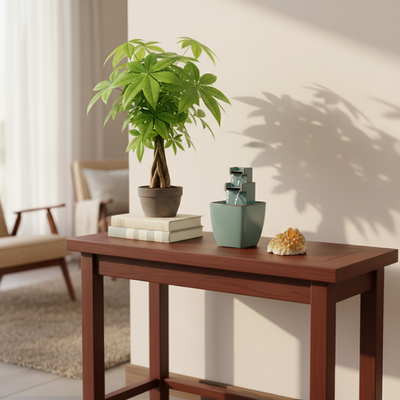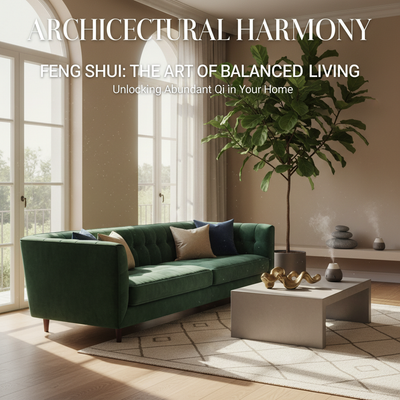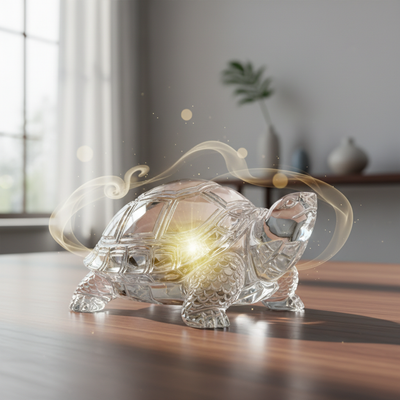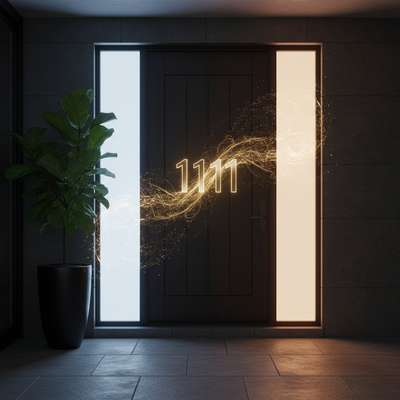The Simple Answer
Many people debate whether spiky plants belong in bedrooms when it comes to feng shui. So let's get straight to the point: can aloe vera be good for your bedroom? The answer is yes, but it's not that simple. Aloe vera has strong healing and air-cleaning powers that can really help a space meant for rest and recovery. However, its spiky leaves also carry sharp, protective energy that needs careful handling.
Whether aloe vera works well in your bedroom isn't just about good or bad. It depends on where you put it, what your room is like, and what you want to achieve. The question isn't whether you should use it, but how and where to place it to get the benefits while avoiding any problems. This guide will help you understand its two-sided energy so you can make a smart choice and place it for the best results.
Healing Energy vs. Sha Chi
To understand why aloe vera can be tricky, we need to learn about two basic feng shui ideas. The first is Chi, the invisible life energy that flows through everything, including our homes and bodies. When Chi flows smoothly and stays balanced, it brings health, harmony, and success. Aloe vera is great at improving this flow. Its well-known healing abilities match its power to clean the energy of a space. Science backs this up too - the NASA Clean Air Study found that aloe vera effectively filters harmful chemicals like benzene and formaldehyde, literally cleaning the air you breathe while you sleep.
But aloe vera also brings something called Sha Chi, or "attacking energy." In feng shui, sharp angles and pointed objects create fast-moving, aggressive energy that can feel disturbing. The spiky tips of an aloe vera plant can produce this Sha Chi, which is why some experts say not to put any pointed plants in a room meant for rest and calm. The goal is to get its cleaning benefits without exposing yourself to this sharp energy.
Understanding Aloe Vera's Chi
To master using aloe vera, we need to look deeper at its unique energy pattern. Basic advice often misses how complex this plant really is. By studying it through the classic principles of Yin and Yang and the Five Elements, we can better understand how it affects your bedroom's environment. This knowledge helps you move beyond simple rules and think like an expert about your own space.
This plant isn't just a simple energy tool. It's a living thing with many layers. Its thick, water-filled leaves give it a soft, caring quality, while its sharp edges and upward growth provide an active, protective force. Understanding this two-sided nature is the first step to using it well. It's a plant of balance, and when placed right, it can help bring that same balance to your personal energy and your life.
Yin and Yang Balance
In feng shui, the bedroom is mainly a Yin space. Yin energy is calm, dark, quiet, and receptive - perfect for rest, healing, and sleep. Yang energy is the opposite: active, bright, loud, and bold. While a bedroom should be mostly Yin, having no Yang energy at all can lead to sluggishness and tiredness.
Aloe vera perfectly shows this two-sided nature:
- Yin Properties: Its thick, fleshy leaves are full of water and healing gel, representing nourishment, peace, and healing power. This is the energy that soothes and heals.
- Yang Properties: Its spiky-edged leaves and strong, upward growth represent protective, active, and vibrant energy. This is the energy that guards and energizes.
The skill in using aloe vera in the bedroom is to add just enough of its gentle Yang energy to prevent sluggishness without disturbing the room's essential Yin calm. It acts as a gentle activator, keeping the Chi fresh and moving while you rest.
The Five Elements View
A deeper look involves the Five Elements theory: Wood, Fire, Earth, Water, and Metal. Every object and living thing relates to these elements. Aloe vera powerfully combines several of them, which explains its strong effects.
- Wood Element: This is aloe's main element. Wood represents growth, life, flexibility, and health. The plant's bright green color and upward growth strongly channel this life-giving energy.
- Water Element: Shown by the gel inside its leaves, the Water element feeds the Wood element. It brings energy of flow, wisdom, and cleaning.
- Fire Element: The sharp, pointed tips of the leaves add a subtle Fire element. Fire connects to passion, expansion, and fame, but also to aggression. This is where the Sha Chi concern comes from and the part that needs the most careful handling.
- Earth Element: The soil the aloe grows in provides the Earth element, bringing stability, grounding, and nourishment to the plant and the room's energy.
Understanding this element mix shows us that aloe vera is mainly a plant of health and growth (Wood) that feeds itself (Water) and stays grounded (Earth), with a small, manageable amount of activating energy (Fire).
The Art of Placement
Now that we understand the theory, let's put it into practice. Proper placement is the most important factor in successfully adding aloe vera to your bedroom's feng shui. Putting it in the right spot can boost its healing and energizing benefits, while putting it in the wrong spot can lead to restless sleep and disturbed energy.
We'll use the Bagua map as our guide. The Bagua is an energy map that goes over your home's floor plan, with each of its nine sections matching a specific area of life. By placing the aloe vera in a matching Bagua area, you align its natural energy with the goals of that zone.
Best Bedroom Bagua Areas
- East (Health & Family): The East area is ruled by the Wood element. Placing an aloe vera plant here is a perfect match. The plant's strong Wood energy will powerfully boost the area dedicated to health and vitality, promoting physical well-being and harmonious family relationships.
- Southeast (Wealth & Abundance): This area is also ruled by the Wood element. The vibrant, upward growth of an aloe vera plant here can symbolize the steady growth of your finances and opportunities. Its life-giving energy helps create an atmosphere of abundance.
- South (Fame & Reputation): The South is a Fire element area. Because aloe vera contains a subtle Fire element in its spiky tips, a small, healthy plant can gently activate this zone. This can help improve your reputation and how others see you. However, be careful here; a large plant might create too much Fire energy, leading to anxiety or burnout.
Smart Placement Goals
- Near a window: Placing your aloe vera on a windowsill where it can get bright, indirect sunlight lets it absorb powerful Yang energy from the sun. It then changes this energy into fresh, nourishing Chi for the entire room, acting as a natural energy converter.
- On a dresser or high shelf: Raising the plant lifts the energy of the room. More importantly, it keeps the spiky "Sha Chi" part of the plant above your body's direct energy field while you sleep, especially if your dresser is across from the bed.
Important Placements to Avoid
- Directly across from the bed: Never have the plant's spikes pointing directly at you while you sleep. This creates a direct line of Sha Chi, which can feel like a subtle, constant "attack." This can show up as restless sleep, nightmares, or waking up feeling on edge.
- Too close to your headboard: The active, upward-growing energy of the plant can be too stimulating for the quiet, Yin energy needed around your head for deep sleep. Keep it at a good distance from your bed.
- In the Southwest corner: We strongly advise against this placement. The Southwest corner rules Love & Relationships. The sharp, spiky energy of the aloe vera can bring conflict, arguments, or a "prickly" feeling into your romantic partnership. This area needs objects that are soft, paired, and harmonious.
A Personal Approach
A one-size-fits-all rule doesn't work in feng shui because every person and every space is unique. The right choice for you depends on your personal situation, the size and condition of your bedroom, and your life goals. This framework will help you make a customized, informed decision.
| Your Situation | Recommendation for Aloe Vera | Reasoning |
|---|---|---|
| A Couple's Bedroom | Use with care. Place away from the bed, in the East or Southeast corner. | To gain healing benefits without letting the "spiky" energy create conflict. Avoid the Southwest (Relationship) corner completely. |
| A Single Person's Bedroom | Generally positive. Can be used more freely to promote self-healing and vitality. | The focus is on personal growth and health. The protective energy can create a sense of strength and independence. |
| If You Have Poor Sleep | Start with a small plant far from the bed, or choose a different plant first. | The active Yang energy, even if subtle, might be too stimulating. Test how it affects your sleep quality before committing. |
| A Large, Sluggish Bedroom | Excellent choice. Use one or two plants to activate and circulate stuck Chi. | The plant's vibrant Wood and subtle Fire energy can break up slowness and bring fresh vitality to a large, energetically "dead" space. |
| A Small, Cluttered Bedroom | Avoid until the room is decluttered. | The first rule of feng shui is to clear clutter. Adding a plant to a cluttered space will only make the chaotic energy worse and add to feeling overwhelmed. |
A Real-World Example

At THE QI FLOW, we often see how small, thoughtful changes can create big shifts in a client's life. This was certainly true for our client, Sarah, who came to us feeling drained, having restless nights, and battling a constant sense of being "stuck" in her career. She loved her home, but her bedroom, which should have been a sanctuary, left her feeling depleted.
During our consultation, we found that the energy in her bedroom was stuck, particularly in the East (Health) and North (Career) zones. The flow of Chi was slow, contributing to her low energy and lack of professional momentum. While there were several changes to be made, one of our key recommendations was adding a specific plant.
We told Sarah to place a single, healthy aloe vera plant on her dresser in the East corner of her bedroom. This placement was intentional: the plant's powerful Wood energy would energize the Health area, its air-cleaning qualities would improve her sleep environment, and its subtle activating energy would help stir the stuck Chi that was affecting her entire life. We also made sure it was raised and not pointing at her bed.
Within a few weeks, the results were amazing. Sarah reported that she was sleeping more deeply and waking up feeling truly refreshed for the first time in months. She felt renewed energy and clarity during the day, which translated into more confidence and action at work. The aloe vera didn't magically solve her problems, but it acted as a powerful catalyst, shifting the room's energy from stuck to vital, which in turn supported her own energy shift.
Caring for Your Plant
In feng shui, the health of your plant directly connects to the quality of energy it brings into your home. A vibrant, thriving plant radiates positive, life-giving Chi. A sick or dying plant, on the other hand, creates draining, negative energy (Yin Chi). Therefore, caring for your aloe vera is an essential part of nurturing your own well-being.
Light for Healthy Chi
Aloe vera thrives in bright, indirect sunlight. Think of sunlight as pure Yang energy. The plant absorbs this energy and converts it into the nourishing life force it releases into your room. A spot near a window that doesn't get harsh, direct afternoon sun is ideal. Too little light will cause the plant to weaken, weakening its positive energy contribution.
Watering for Smooth Flow
Overwatering is the most common way to kill an aloe vera. You must let the soil dry out completely between waterings. In feng shui terms, this practice is crucial. Constantly wet soil creates "damp" or "stuck" energy in the pot, which can translate to sluggish energy in your room. Allowing the soil to dry ensures a healthy cycle of wet and dry, mirroring a healthy, dynamic flow of Chi.
The Right Pot and Soil
Your choice of pot and soil matters. Always use a pot with a drainage hole. This is absolutely necessary. A drainage hole provides an "escape route" for excess water and negative energy, preventing stagnation. Using a well-draining cactus or succulent soil mix is also key. For an extra energy boost, choose a terracotta or ceramic pot. These materials come from the earth and enhance the plant's grounding Earth element, adding a sense of stability to your space.
Energy Maintenance
Just like any other object in your home, your plant needs energy cleansing.
* Dust the leaves regularly with a soft, damp cloth. In feng shui, a layer of dust on any surface creates stuck Chi and blocks the flow of positive energy.
* Remove any dead, brown, or yellowing leaves immediately. These represent decay and drain energy from both the plant and the room. Cutting them away keeps the plant's energy vibrant and focused on new growth.
Other Options Besides Aloe Vera
After considering all the factors, you may decide that aloe vera isn't the right fit for your bedroom right now. That's perfectly fine. The goal is to create a space that feels good to you. Fortunately, there are many other wonderful feng shui-friendly plants that are perfect for a restful sanctuary. These options generally have soft, rounded leaves, which create gentle, nurturing Chi.
- Snake Plant (Sansevieria): This plant is a powerhouse air cleaner, also noted in the NASA study. It has strong protective energy, but its growth is vertical and sword-like, which is considered less aggressive than the "pointy" nature of aloe.
- Peace Lily (Spathiphyllum): Known for its calming and uplifting energy, the Peace Lily has lush green leaves and produces beautiful white flowers that symbolize purity and peace. It's also very tolerant of lower light conditions common in bedrooms.
- Jade Plant (Crassula ovata): With its soft, rounded, coin-shaped leaves, the Jade Plant is a classic feng shui symbol for good luck and prosperity. Its gentle energy is excellent for promoting harmony and is considered safe for all areas of the bedroom.
- Pothos (Epipremnum aureum): Often called Devil's Ivy, this trailing plant has soft, heart-shaped leaves that create a gentle, cascading flow of energy. It is incredibly easy to care for and is excellent for softening sharp corners or filling empty vertical space.
Move Forward with Purpose
The question of whether aloe vera is good or bad for the bedroom has a clear answer: its effect depends on your intention and your actions. It is not a naturally negative plant; it is a powerful tool with a two-sided nature that must be respected and handled with knowledge. Its healing and cleaning properties are undeniable, but so is the sharp energy from its spikes.
By following the principles of placement, you can harness its incredible benefits while neutralizing any potential downsides. Remember the most important rules: keep it at a distance from your bed, never place it in the Southwest relationship corner, and always ensure the plant is healthy and thriving.
In the end, trust your gut feeling. Use this guide to place your aloe vera with purpose, and then pay attention to how your space feels. The goal is to create a bedroom that serves as a true sanctuary - a place that feels both deeply restful and gently energizing.







